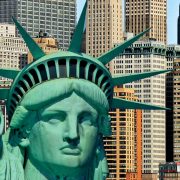The EB-5 visa program has not been immune to the effects of the COVID-19 pandemic: The closure of overseas U.S. embassies and consulates and domestic United States Citizenship and Immigration Services Offices (USCIS) offices have stalled the EB-5 visa process for investors living both overseas and in the United States. The pandemic has also wreaked unprecedented levels of havoc on the U.S. economy. In response to this economic turmoil, President Trump signed a proclamation on April 22, 2020, that places a temporary hold on immigration to the United States. This measure is part of a plan by the U.S. government to ensure that U.S. workers are prioritized for jobs when the economy starts back up.
The proclamation suspends certain forms of immigration for 60 days in an attempt to curtail the supply of foreign labor entering the United States. This is so that U.S. workers can, as President Trump stated, “be first in line for jobs as our economy reopens.”
Not all forms of immigration are prohibited by the proclamation. Among the exceptions are EB-5 investors and their spouses and unmarried children under 21 years of age. However, it is important for EB-5 investors to keep an eye on global travel restrictions, as such restrictions may overrule their exemption from the new immigration ban. Investors should consult with their immigration attorney about their individual situations and the options available to them.
The exemption of EB-5 investors from the immigration ban is not surprising given the benefits the EB-5 program offers the U.S. economy. To participate in the EB-5 program, foreign investors must invest a minimum of $900,000 for projects in a target employment area (TEA) and $1.8 million for projects outside of a TEA. This means a substantial influx of capital into the U.S. economy, which is essential during a recession. Additionally, the EB-5 program requires that an EB-5 investor’s capital fund the creation of 10 new full-time jobs for U.S. workers. With unemployment numbers still on the rise, the jobs created by EB-5 projects will greatly benefit economic recovery efforts.
During the global recession in 2008, EB-5 investors provided much needed funds for developers who were unable to obtain traditional funding for their projects. Those investments helped boost the U.S. economy and created countless jobs for U.S. workers. Given that track record, it would not be unexpected for the EB-5 program to be part of the government’s economic recovery plan.







